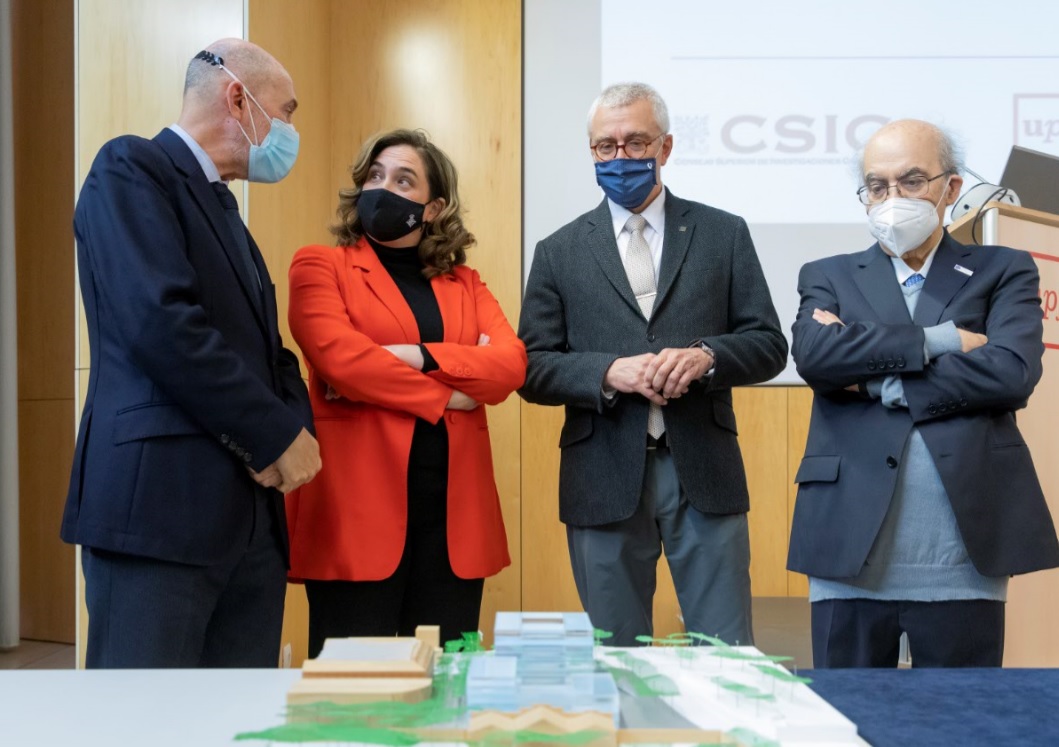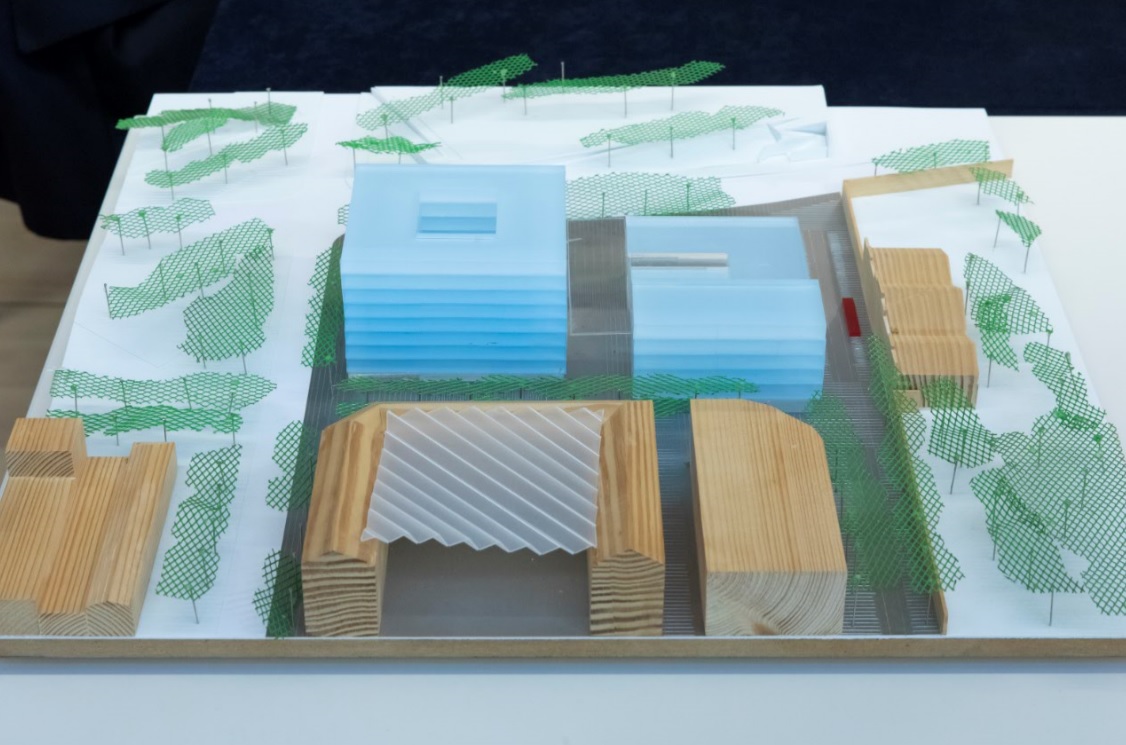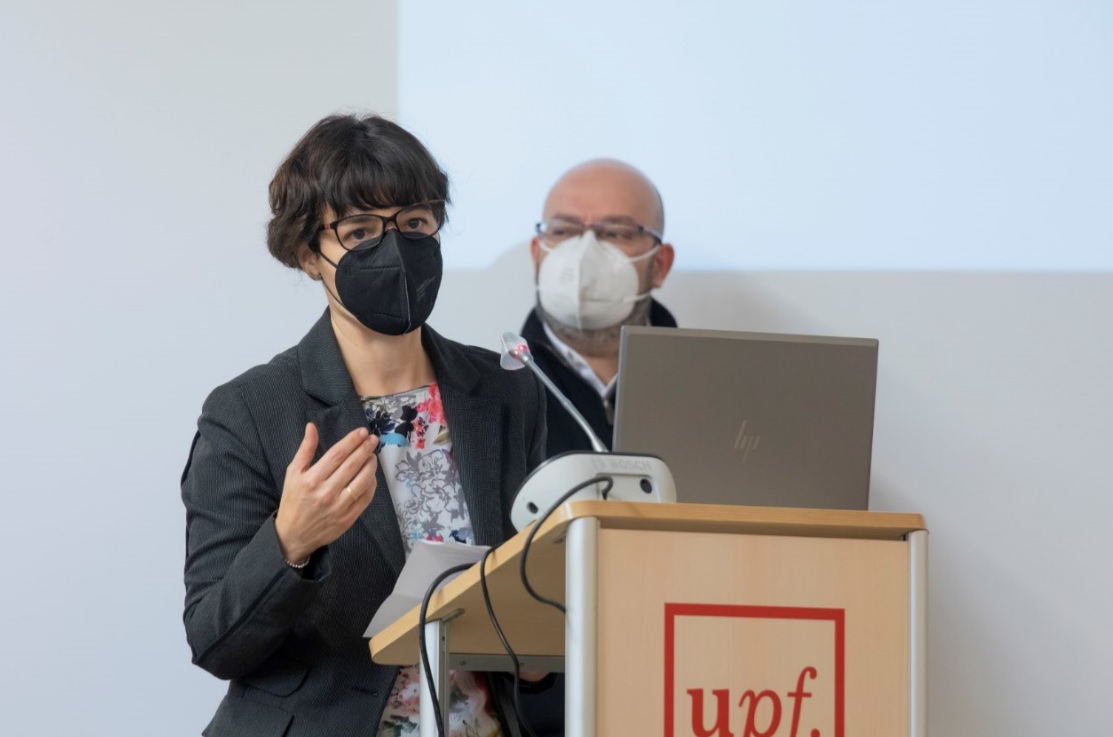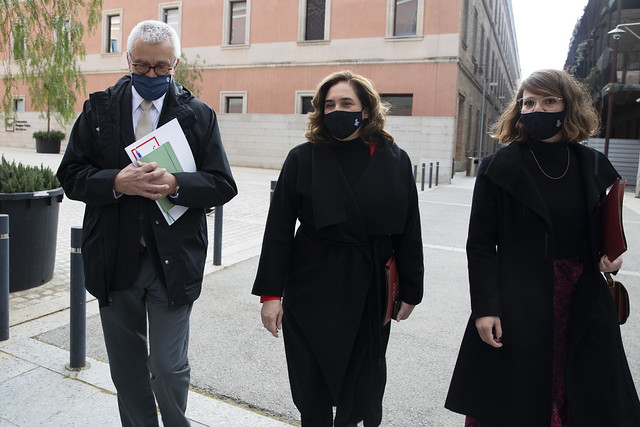The project of the old Fish market takes a decisive step towards its implementation
The project of the old Fish market takes a decisive step towards its implementation
The project involves the creation of a new research and innovation complex focusing on biomedicine, biodiversity and planetary wellbeing, which will be located right next to the UPF Ciutadella campus and Ciutadella park. The space will gather around 1,200 people, with a high concentration of scientific talent. The project is promoted by UPF, with the participation of two strategic partners, the Spanish National Research Council and the Barcelona Institute of Science and Technology.

The project for the old Fish market involves the creation of a new research and innovation complex focusing on biomedicine, biodiversity and planetary wellbeing, which will be located on land formerly occupied by the market, right next to the UPF Ciutadella campus and Ciutadella park. It is a space that will gather some 1,200 people, with a high concentration of scientific talent. The project is promoted by UPF, with the participation of two strategic partners, the Spanish National Research Council (CSIC), and the Barcelona Institute of Science and Technology (BIST).
A few days after Barcelona City Council’s Ecology, Urban Planning, Infrastructures and Mobility Committee gave its approval of the Special Urban Improvement Plan (PEMU), and before the plenary of the City Council on 26 March voted definitively in favour thereof, UPF’s Ciutadella campus hosted a ceremony on 18 March with the institutions and research centres involved, who outlined all these advances made in the field of urban planning and the current status of the scientific project.
The event, which was held in the multipurpose room of the Mercè Rodoreda building, involved the participation of Ada Colau, mayor of Barcelona, and Jaume Casals, rector of Pompeu Fabra University, who explained the latest developments concerning the old Fish market project, which comes under the “Citadel of Knowledge” initiative; Janet Sanz, deputy mayor of Barcelona City Council responsible for Ecology, Urban Planning, Infrastructures and Mobility, outlined the special urban plan.
Meanwhile, Josep Lluís Martí, vice-rector for innovation projects at UPF; Ester Oliveras, UPF sustainability delegate; Salvador Carranza, director of the Institute of Evolutionary Biology (IBE); Luis Calvo, representing the CSIC in Catalonia; and Gabby Silberman and Andreu Mas-Colell, managing director and chair of the Barcelona Institute of Science and Technology (BIST), respectively, presented the status of the scientific project which is to be carried out at the centres and their importance to the Catalan research ecosystem.
Jaume Casals, UPF rector, got the event under way, clarifying that this project, which aims to position Barcelona as a city of science “should have not a perspective of the sum of the various participating institutions, but a ‘multiplicity of interpenetration’, of permeability, based on a good style of citizen and at the same time commits the city”.
The project aims to position Barcelona as a city of science “should have not a perspective of the sum of the various participating institutions, but a ‘multiplicity of interpenetration’, of permeability, based on a good style of citizen and at the same time commits the city”.
Ada Colau asserted that the old Fish market “is a commitment by the city that has many stakeholders, and is steadily advancing”. “Today sees the materialization of a project that we presented in the same room in April 2019, and there’s no turning back and it will be a reality for Barcelona”, she assured. The mayor highlighted that it is a project of transformation and rehabilitation, a hub of science and innovation, which has enjoyed the consensus of all of the municipal groups, and that “it reflects a cross-cutting way of working, of consensus, which we hope will be the norm rather than the exception”.
Janet Sanz recalled that “at a time lacking certainties for young people and future prospects, this project is a certainty for the future, putting urban planning at the service of research through a quality economy”. The deputy mayor explained the various aspects of the project related to planning, of which she stressed that it is set in a strategic area of the city, in a symbolic location, and that within the framework of the Citadel of Knowledge, aims to promote synergies with surroundings, in a permeable space facilitating such interaction.
Referring to the new urban plan, which arranges plots, redefines uses and establishes the characteristics of buildings, she said that all constructions will respect the environment, and will involve integrated solutions for water and waste management, reduced energy demand, which will limit noise and environmental pollution and be well connected.
UPF, BIST and IBE: a cooperative project

The old Fish market project will involve the construction of three new buildings, which will house the Barcelona Institute of Science and Technology (BIST), the Institute of Evolutionary Biology (IBE), a joint centre between UPF and the Spanish national research Council (CSIC), and the UPF building dedicated to research on Planetary Wellbeing. Moreover, there will be new underground parking, built and managed by the company Barcelona Serveis Municipals (BSM).
The work is scheduled to start in April 2022 and the first researchers are expected to begin work there in the first half of 2025.
All in all, 46,000 square metres, with an investment of 92.8 million euros, which will be provided by the CSIC, the Catalan Government and Incasòl, and applications for loans from the European Investment Bank loans. The work is scheduled to start in April 2022 and the first researchers are expected to begin work there in the first half of 2025.
To complete and enrich the new research and innovation complex to be built at the old Fish market, an artistic installation is envisaged in a prime, central location of the complex that will identify the site as an iconic space of the city, a cultural focal point of the district and become an element of regeneration and interconnection with local entities and the Citadel of Knowledge.
The UPF building, dedicated to Planetary Wellbeing
The Planetary Wellbeing project, a strategic initiative of UPF to position itself as a global benchmark in research and innovation around this new concept, understood as an integral goal of human development, based on the evidence that human wellbeing (in its broader sense) is heavily dependent on the natural and environmental equilibrium of the Planet, and the strength and legitimacy of society’s political, financial, legal and cultural institutions.
In this context, UPF will locate there its Centre for Research and Innovation for Planetary Wellbeing, which will become a meeting point for national and international research and innovation groups carrying out interdisciplinary collaborative projects in various fields such as Global health, City science, Global governance and global challenges, Data science and digital technologies, Complex systems and Meta-Research.
UPF will locate there its Centre for Research and Innovation for Planetary Wellbeing, which will become a meeting point for national and international research and innovation groups carrying out interdisciplinary collaborative projects in various fields such as Global health, City science, Global governance and global challenges, Data science and digital technologies, Complex systems and Meta-Research.

During the presentation, Josep Lluís Martí, vice-rector for innovation projects at UPF, explained that the new centre has three macro-objectives: to conduct interdisciplinary, international research, geared towards the search for solutions in a context of urgency, with the presence of the social sciences and street science; to transform the University, both in terms of teaching and research and with regard to knowledge transfer; and to transform society by stimulating it.
For her part, Ester Oliveras, UPF sustainability delegate, underlined that the priorities of the new centre will be to give visibility to the Sustainable Development Goals (SDG) in the curricula; ensure that students have a minimum knowledge of Planetary Wellbeing; enable them to expand such knowledge through a minor, and obtain European funding to promote the transformation of teaching.
The IBE building, dedicated to biodiversity
In the new building, the IBE will host its 130 researchers grouped into 25 research groups, who are currently working in two separate buildings, and will open two new scientific programmes in “Conservation” and in “Evolution of behaviour”, to expand its scientific activities. With its own building, the IBE will consolidate its growth project for the coming years, until it reaches a maximum of 35 research groups, essential to compete internationally.
The IBE will host its 130 researchers grouped into 25 research groups, who are currently working in two separate buildings, and will open two new scientific programmes in “Conservation” and in “Evolution of behaviour”, to expand its scientific activities.
Salvador Carranza, director of the IBE, highlighted that the activity of the researchers who will be hosted in the new building will pursue three areas: “Discovering life, deciphering evolution, and conserving biodiversity”. He reviewed various emergencies faced by our planet, such as the massive loss of biodiversity, and the sixth great extinction, caused by man, which is different from the previous ones, which were due to natural causes. They are to examine this through interdisciplinary, innovative projects, based on evolutionary biology, biodiversity and conservation.
Lluís Calvo, representing the CSIC in Catalonia, pointed out some of the major challenges that this project may manage to concretize: “It is essential to create aggregate critical mass”, he emphasized. “We must join forces, pool scientific knowledge, hence the newly launched European Horizon programme will be crucial, based on scientific excellence, innovation and impact”.
The BIST building, dedicated to personalized medicine
The Barcelona Institute of Science and Technology (BIST) is a multidisciplinary research institute based on the capacities and aspirations of seven Catalan centres of excellence: the Center for Genomic Regulation (CRG), the Institute for Bioengineering of Catalonia (IBEC), the Institute of Photonic Sciences (ICFO), the Institute of Chemical Research of Catalonia (ICIQ), the Catalan Institute of Nanoscience and Nanotechnology (ICN2), the Institute for High Energy Physics (IFAE), and the Institute for Research in Biomedicine (IRB Barcelona).
At the old Fish market, the BIST will create a new area of research and innovation in precision medicine (BiomedBIST), where it will bring together research groups that are currently scattered around different centres, working in the field of biomedicine.
More than 500 scientists will work in the new building, spread across 50 research groups. Some of the lines they will be pursuing are “precision medicine, based on patient stratification and new technologies, and new, personalized treatment approaches”.
According to Gabby Silberman, managing director of the BIST, more than 500 scientists will work in the new building, spread across 50 research groups. Some of the lines they will be pursuing are “precision medicine, based on patient stratification and new technologies, and new, personalized treatment approaches, such as nanomedicine, immune response modulation and tissue regeneration to achieve, for example, progress in areas such as healthy ageing”.
To finish, Andreu Mas-Colell, chairman of the BIST, said that “the greatest virtue of the project is for it to keep up the pace, to never stop, and strengthen the research hubs that give strength, vitality, economic and cultural impetus to their surroundings”.

